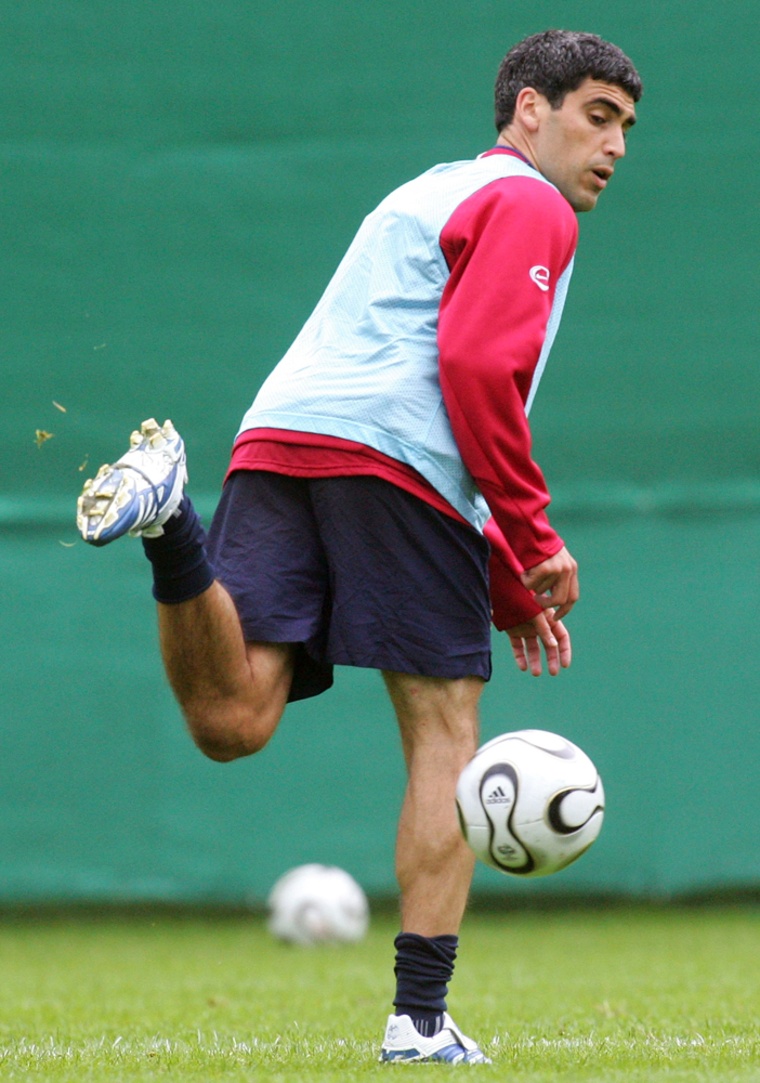Claudio Reyna was taken aback.
"Do you sort of feel responsible for the development of soccer in your country?" a German reporter asked the U.S. national team's serene captain.
"Me?" Reyna responded incredulously, prompting laughter from the gathered media Friday.
Bruce Arena, Reyna's coach at the University of Virginia in the early 1990s and his national team guide for more than seven years, put his right arm around his most experienced player and said, "Congratulations!"
Like his subtle contributions on the field during the course of a match, Reyna has had an understated impact on the sport's growth in the United States. Although he has not scored a goal for the national team in six years and his availability is often compromised by injury and professional commitments in Europe, he remains one of the most enduring figures in American soccer.
Reyna is on his fourth World Cup roster, a U.S. record shared with goalkeeper Kasey Keller, and after injury and disappointment marred his first two tournaments and an historic run highlighted the third, Reyna is gearing himself for what is likely to be his final run with the national team.
"He's more experienced, he's more confident and I think more prepared for this World Cup than the last one," Arena said. "I just think he knows this is one of his last great opportunities as a player and he wants to make the most of it."
Health concerns, however, have put his availability into question. Reyna, who will turn 33 next month, strained a hamstring less than 15 minutes into a friendly against Morocco on May 23 and did not play in subsequent matches against Venezuela and Latvia.
U.S. practices here have been closed, except for the uneventful first 15 minutes, so his progress has been difficult to monitor. Arena said Saturday that Reyna was "fully active" during the morning session and that he is "pretty close to fully fit."
In 1994, when he was the youngest player on the roster, Reyna missed the World Cup with a hamstring injury, and in 2002 he sat out the opening game with a strained quadriceps. But he returned to guide the Americans to the quarterfinals, their best performance in the sport's premier event in 72 years.
After building his reputation as a playmaking midfielder, Reyna has undergone a role change in recent years. In the 2002 round of 16, Arena surprised Mexico by sending Reyna to the right side of midfield, where he directed the U.S. attack. These days, he has largely yielded to a pair of energetic 24-year-olds, Landon Donovan and DaMarcus Beasley, and played a deeper midfield position where he is more of an organizer than an instigator.
"I think I can still influence the game playing a little further back," he said last week. "It's part of my evolution as a player, and I'm going to go wherever Bruce wants me."
Where Arena wants him in this World Cup -- assuming he is healthy -- and as part of what formation remains to be seen. Reyna might end up being paired with Pablo Mastroeni or John O'Brien behind the scheming Donovan, or he could be left on his own in a defensive midfield role. If Arena pushes Donovan to the front line, Reyna could land in the attacking midfield slot.
While many U.S. fans in Internet chat rooms and on message boards have wondered whether Arena is too committed to Reyna, U.S. players appreciate the veteran's experience and calming influence.
"He's going to do things the right way," Donovan said. From Reyna, "I've learned how to be patient because I've always been taught to go, go, go. He understands the rhythm, the flow, when you need to go, when you shouldn't go, and Claudio has that down to an art. He understands that like nobody else."
Reyna's arrival in Germany this weekend provided him with a flood of memories. It was here that he launched his pro career with Bayer Leverkusen in 1994, and he later starred at Wolfsburg. (Eventually, he moved to Glasgow Rangers in Scotland, and then to England to play for Sunderland and finally Manchester City.) Although his national team career is nearing the end, he said he plans to continue playing in Europe for the foreseeable future before possibly going to MLS.
Playing in the Bundesliga, "For me, it was an incredible experience because the professionalism of the German players and clubs was something new for me, and it's really where I started to grow as a player," he said. "It was like my foundation for being a professional, and the league is very tough, very physical, and I was playing with very good players."
Health permitting, he is hoping to show the German fans how far American soccer has progressed.
"The last World Cup was fantastic for us, as a team, our country and the sport, but we know we want to do the same thing," he said. "It's nice to have expectations at a World Cup and not just to come up here and have a good time. We're serious about being here and doing well."
